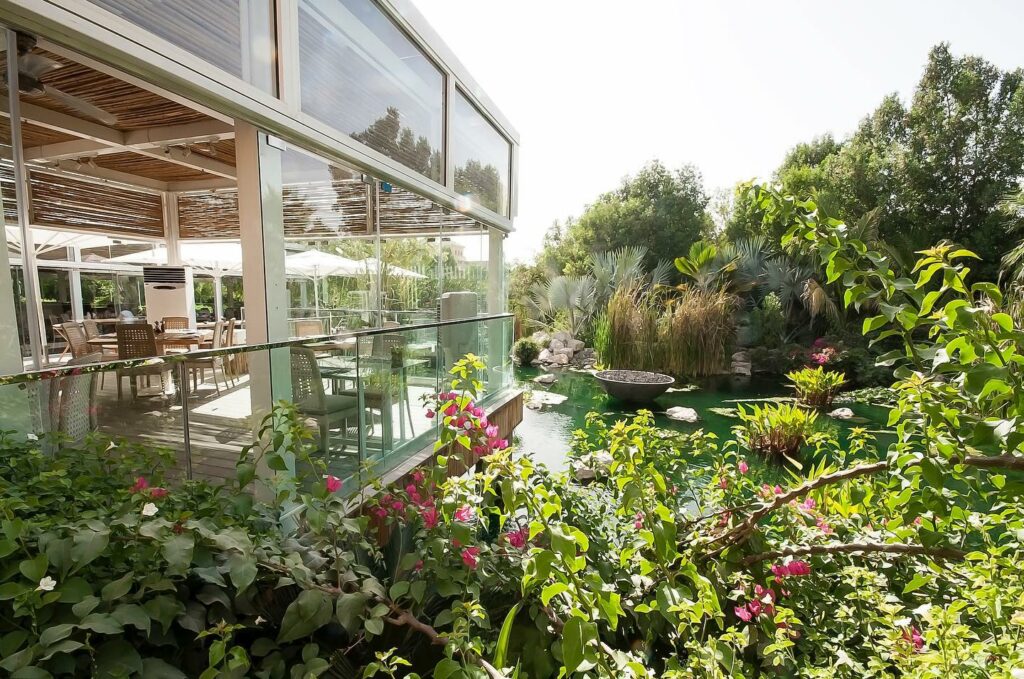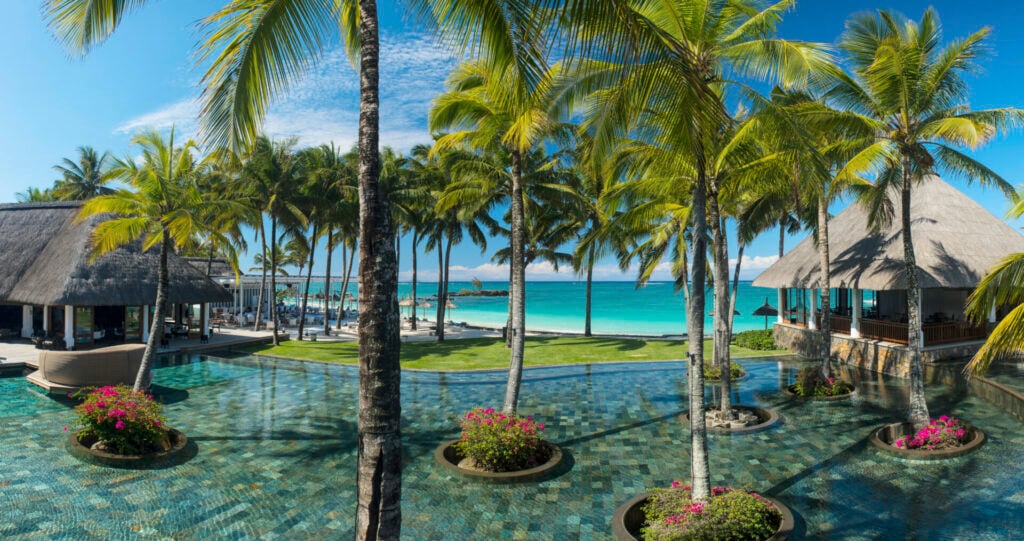Peering down at my feet, the surface I’m standing on looks like any other path: plain and simple tarmac, snaking from my holiday home for the week past other lodges set around a lake. But this is far more than bog standard tarmac. The surface I’m standing on is made of disposable nappies. Yes, I did say nappy, and yes, it has been used. It’s a world-first and just one of many elements that have gone into ensuring Bluestone National Park Resort in Pembrokeshire, Wales, is as sustainable as it can be.
Thankfully, if you didn’t know what the path was made of, you’d never guess. But the fact that the former dairy resort, which opened as a sustainable holiday resort in 2008, has invested in world-leading technology to safeguard the future of the planet, is telling of the focus many destinations across the world are now putting on sustainable travel. Nappy holidays, if you will.
And no wonder, given it’s high on the agenda for travellers these days. A survey by Booking.com found that 82 per cent of millennials said they want to travel more sustainably in the future, and 70 per cent said they would be more likely to book an accommodation if they knew it was eco-friendly.
Meaningful Experiences
More recently, research showed how Millennials (those born between 1981 and 1996) and Gen Z (born between 1997 and 2012) are steering travel trends with a focus on technology, sustainability, and a quest for distinctive and meaningful experiences. Skift Research’s latest report ‘Exploring Gen Z and Millennial Travel’ found that the two generations have a shared interest in prioritising and finding tourism operators adhering to social and environmental standards, and showing a preference for sustainable travel practices.
Resorts around the world are answering this demand for more sustainability – and not just by ditching plastic straws and encouraging people to recycle – with many investing heavily in technology and ground-breaking efforts to be truly more sustainable. And that effort isn’t just limited to luxurious destinations and resorts, as proved by Bluestone.
A huge 82 per cent of millennials said they want to travel more sustainably in the future, and 70 per cent said they would be more likely to book an accommodation if they knew it was eco-friendly
Potentially seen by some as a humble UK holiday park, Bluestone’s founders have put sustainability at its heart from the get-go. It became the first company in the world to use nappy recycling technology in the construction of infrastructure for its range of Platinum Lodges, unveiled in 2023, using 60,000 disposable nappies.
Nappy Recycling
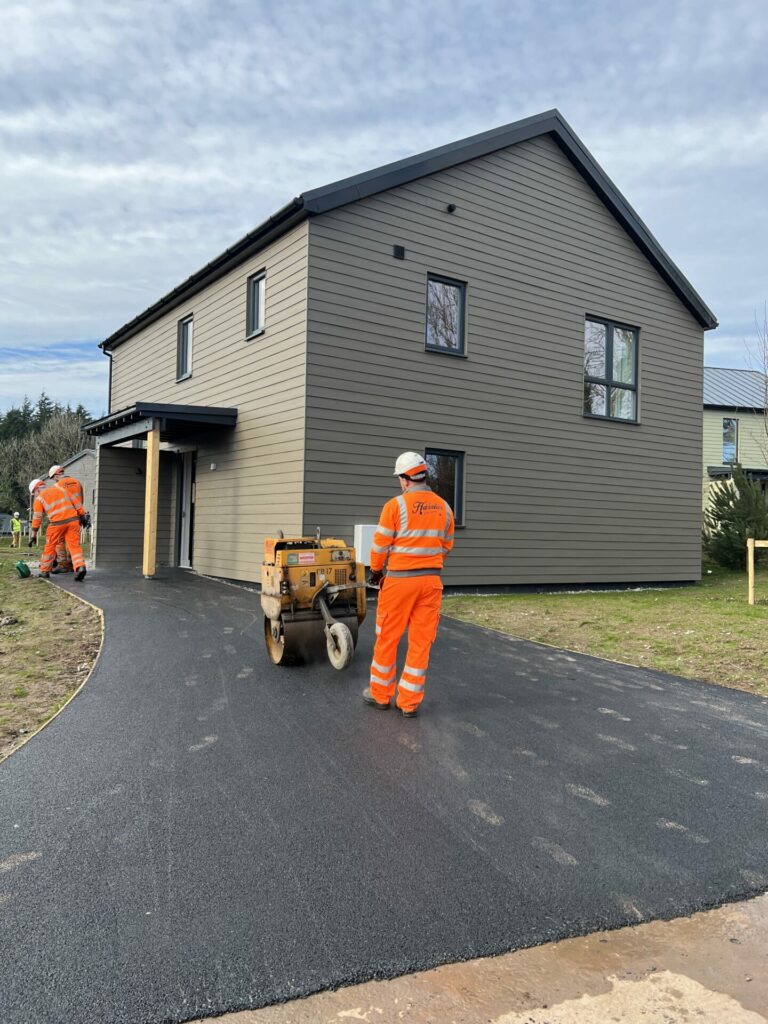
The Green Key collaborated with Wales-based company Nappicycle, who are pioneering the technology. The nappies are cleansed before the usable fibres from the plastic are separated and used to reinforce the asphalt, replacing traditional materials typically. The initiative isn’t just key for Bluestone, but the team behind it believes the ground-breaking venture could be widely adopted in roads across the UK to further reduce carbon emissions associated with laying and repairing roads and pavements.
Marten Lewis, Director of sustainability at Bluestone, said: ‘Every year, around 140 million disposable nappies are binned in Wales – let alone across the UK. They’re a single-use plastic and, if landfilled, can take hundreds of years to degrade. Recovering and finding a new application for them has huge environmental benefits. The process not only reduces waste disposal but cuts overall carbon emissions, making for a more durable surface and creating sustainable jobs. And, no, there is no smell.’
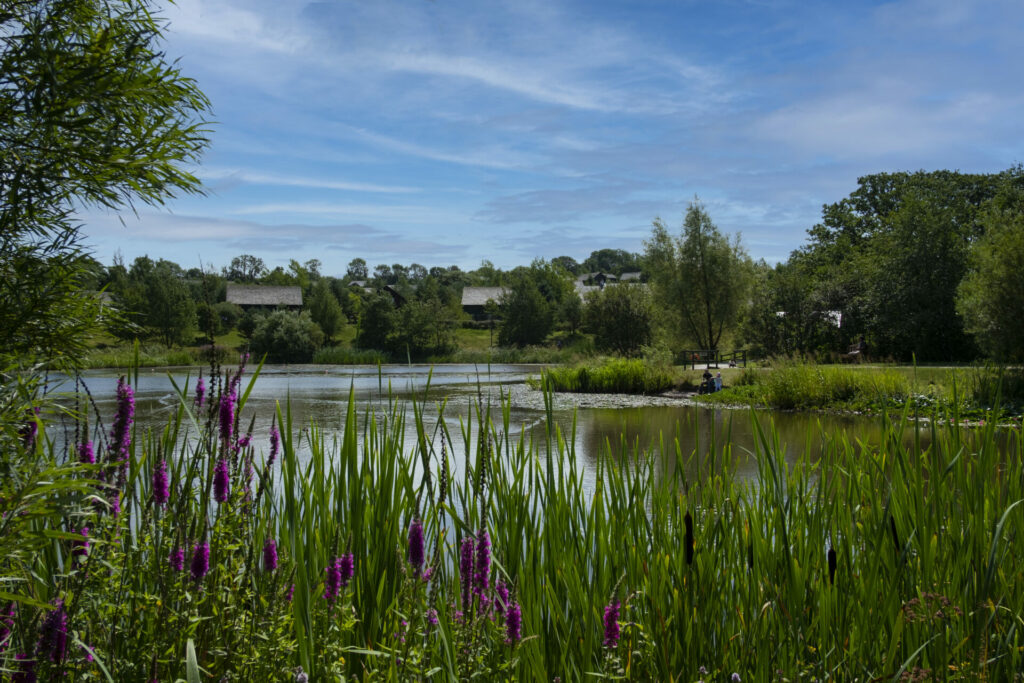
The nappy paths are just one of the latest in a range of innovative sustainable initiatives at the five star resort. Platinum Lodges have been built with sustainable construction methods, work has started on a 5-hectare solar farm which will create enough electricity for 30 per cent of Bluestone’s power needs per year and is part of its ambition to achieve net zero status in 2040. The resort’s The Blue Lagoon Water Park, an activity center called The Hive, and 60 of its lodges are all heated with locally sourced biomass rather than oil, saving more than 1,000 tonnes of CO² emissions a year.
The question of sustainability and green energy is high on the list for hotels worldwide. Plans are even afoot for a new Eco-Floating hotel that can generate its own electricity by rotating and will be able to float from location to location
To help conserve water, Bluestone developed smart sub-meters to keep close track of water use and identify potential savings, and has fitted aerators to almost 500 showers, helping to cut water usage in half. The company designed and created the roof of its Serendome to capture rainwater for irrigation, and the site even has its own water treatment works.
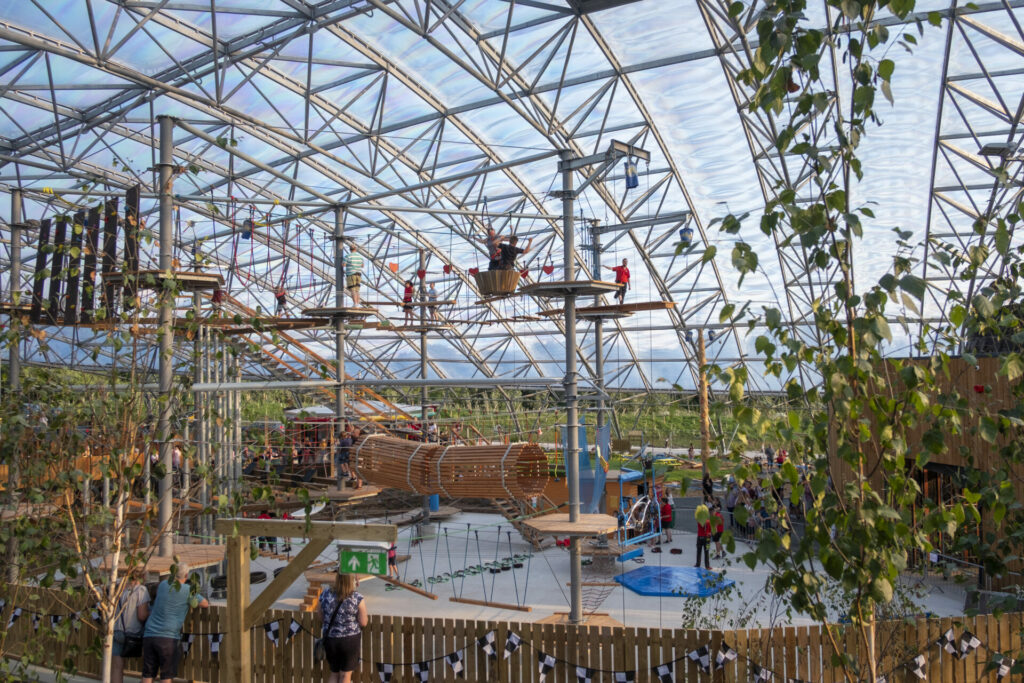
In addition, all 80 tonnes a year of its food waste is taken to a nearby anaerobic digestion facility, where it is turned into green energy and organic fertiliser for local farmers, while every year around 8,000 litres of used cooking oil is sent to be made into biodiesel. Since opening, 60 acres of woodland have been planted, along with the creation of two new lakes as part of a rewilding project which is returning dozens of acres of pasture to natural grassland.
Eco-Floating Hotel
But Bluestone isn’t alone. The question of sustainability and green energy is high on the list for hotels and resorts worldwide. Plans are even afoot for a new Eco-Floating hotel that can generate its own electricity by rotating. The hotel, which will reportedly initially be based in Qatar, will be able to float from location to location. According to reports, work led by Hayri Atak Architectural Design Studio (HAADS) started in 2020 and the hotel is hoped to be up and running by 2025. Created around principles of minimum energy loss and zero waste, the way the 152-room structure is designed is aimed to generate electrical energy to power the entire building.
The hotel will constantly rotate, completing a full revolution in 24 hours and will stay within areas that have continuous currents to make sure that it is constantly rotating. It will use a form of green energy production called ‘vawtau’ (vertical axis wind turbine and umbrella) which works as a wind turbine on the vertical axis and has a function as a sun umbrella on the coastal band. On top of this, its vortex-shaped roof will collect rainwater that can be used to irrigate the hotel’s green sites, while also being able to purify sea water and wastewater.
The rooms will have their own separate balconies, through which they will be able to access different parts of the ocean with each rotation. It will also include indoor and outdoor pools, a sauna, spa, gym and mini-golf.
Sustainability Levy
While many operators, creators and owners are putting their hand in their pocket when it comes to prioritising sustainability, there is also an argument that it’s incumbent on us, the travellers, to play our part. Environmental levies are one way – the Seychelles Ministry of Finance, Economic Planning, and Trade last year announced a Tourism Environmental Sustainability Levy ranging from $2- $8 per person per night to contribute towards preserving the Seychelles unique but fragile environment. A similar step has been put in place by luxury resort chain Soneva, which has resorts in the Maldives and Thailand. It introduced a two per cent environmental levy on all stays back in 2008.
We have a huge responsibility to make that impact a positive one. But it is hard. Hotels run 365 days a year; lots of the buildings are old, and many are big, with 300-plus rooms. Changing how we operate them is a big job.
With tourism producing roughly eight per cent of the world’s carbon emissions, it’s clear both owner and guest need to play their part, with tech and engagement with newer ways of building and heating resorts, and the myriad ways their impact can be lessened, playing a key role.
The importance cannot be underestimated, says brand strategist and hotel expert Katie Brinsmead-Stockham, founder of Hotel Hussy. ‘In 2023 the overall contribution of travel and tourism to the global GDP was over 9 trillion US dollars,’ she says. ‘That shows how big the industry is and what an enormous impact we have.
‘We have a huge responsibility to make that impact a positive one. But it is hard. Hotels run 365 days a year; lots of the buildings are old, and many are big, with 300-plus rooms. Changing how we operate them is a big job. And sometimes when brands try to do the right thing, like getting rid of small toiletries bottles, it’s not seen as enough. Doing something is better than nothing.’
While innovation may help come up with some answers that can be used across the board, the issue requires more than a paint-by-numbers approach, she insists. ‘Hotels touch every single industry – from building materials, paints and fabrics to cleaning products, toiletries and food suppliers,’ Katie explains. ‘This can be seen as an opportunity rather than a challenge. By making better decisions about which supplier we choose we can make a big difference to our environmental impact.
‘Whilst globally we all need to be more sustainable, the solutions need to be thought about at a local level. What is the right choice in the Maldives may be very different to Morocco. We need to look at our impact on the planet but also the people in the communities we operate.’



